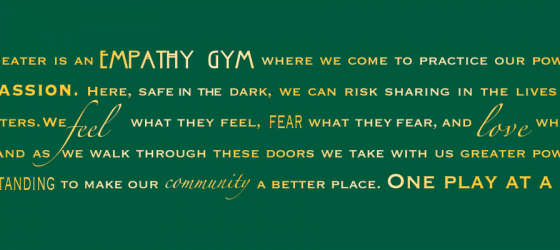They are calling this the age of disinformation – the systematic and knowing flooding of the airwaves with false statements – the countless barrage of small untruths and the big lies that are so outrageous, how could they not be true?
Amplified by the power of social media, disinformation is being used to drive unwitting citizens into more and more radical camps. Fed by “the big lie,” struggling Americans buy into conspiracy theory to account for their fears, dissatisfactions, prejudices, suspicions, racism. Long the tool of despotic totalitarian regimes, disinformation has swayed a terrifyingly large minority to embrace the political agenda of a budding tyrant and his accomplices in lies.
An always an elusive ideal, truth has gotten a bad name. Few of us trust any expression which purports to be true. We’re not sure there is such a thing anymore. Everything these days is suspected of being spin, self-promotion, the flavor of the month, propaganda. The tentacles of social media’ algorithms have us firmly in their grip and as the great documentary The Social Dilemma puts it, we are mostly unaware of the reasons we are buying things or subscribing to political points of view because the persuasive tools strike at an unconscious level where we think they are our own ideas. Where can we be safe from this barrage of untruth? Is there a shelter to protect us from the slings and arrows of falsehood?
Fifty years ago, in their book Teaching as a Subversive Activity, Neil Postman and Charles Weingartner argued that “crap detecting”–a term borrowed from a mid-century Ernest Hemingway interview–should be an “essential function” of schools, so students can identify and challenge “misconceptions, faulty assumptions, etc.” In that same way, I have always felt theatre was a subversive activity, in the best sense of the word. By using empathy, satire, tragedy, we pry apart corrupt structures, false ideologies, destructive programming. Sophocles dove into the stubborn, despotic male dictator to find empathy; Moliere used satire to excavate the corrupt structures of Catholicism; Arthur Miller deconstructed the falseness of the American Dream; Rajiv Joseph uncovered the destructive power of colonialism.
Great drama more often than not points out what is not true, rather than what is. Throughout history, untruth has always hidden in the disguise of simple appearing phrases: a jingle, a song, a comfortable cliché, a brand, a saying. Disinformation says, “See how simple it is? Embrace me. I am a soundbite, easy to absorb, easy to remember, an easy solution.” In the midst of mind-boggling complexity, disinformation hooks us with a conveniently simple line in the same way heroin holds out peace to a soul at war with itself.
The truth is, there is nothing simple about truth. If we are truly aware, whenever we hear a simple solution, our crap-detector rings the alarm. Too easy. Too convenient. Too reductive.
Theatre is the place we come to address the elusiveness and complexity of truth. We open ourselves up to “not knowing,” to risk having our assumptions challenged, our certainty destroyed, our prejudices blown apart. It is no wonder that the first art suppressed by totalitarian regimes is the theatre. Dramatists by their very nature are born crap-detectors. They are congenitally unable to let a lie pass. Like a knee-jerk reaction, their foot will fly up to kick the dickens out of a falsehood. I don’t know why this is, or why as writers they are drawn to the theatre over other writing forms. But in all the hundreds of playwrights I’ve worked with, this is a common denominator. Why? Perhaps it’s because we do it together. We’re all there in person in the theatre. There is nowhere to hide. So, no matter what kind of half-truth is perpetrated in the theatre, there will be someone to stand up and say bullshit. Someone to stand up and say, “He has no clothes.” To quote PT Barnum, “You can’t fool all the people all of the time.” And when we are together in the theatre, we are all the people.
So theatre can only be a forum for exploring the multifaceted, elusive, complex, contradictory, infuriatingly impossible to understand, truth. There is no one truth, there are thousands of overlapping, discordant, simultaneously existing truths which will never be reduced to an algorithm or a creed. Maturity can be defined as being able to hold and simultaneously contemplate contradictory facts. Our mind may tell us someone is wrong, but our hearts disagrees. So we have to work it out! Empathy is the opposite of judgement. There is no right or wrong with compassion. We come together in the theatre with the courage to face contradiction and the openness to embrace opposites. Because our experience is too complex to be boiled down a simple right or wrong. As Krishnamurti put it:
“Truth has no path, and that is the beauty of truth, it is living.”
Please write me at [email protected] to share any thoughts you may have.
In gratitude,
Bill English (Artistic Director)



